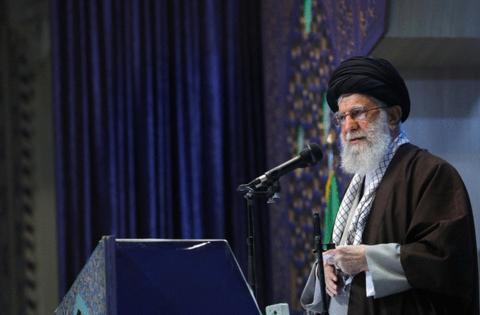Iran, European powers meet in bid to avoid nuclear crisis
Published in News & Features
Top diplomats from Europe and Iran met in New York to try to avert a fresh crisis over Tehran’s nuclear program, as the Islamic Republic’s supreme leader rejected prospects of new talks with the U.S.
Foreign ministers from France, Germany, the U.K. and the European Union’s top envoy held talks with their counterpart, Abbas Araghchi, on the sidelines of the United Nations General Assembly in New York on Tuesday, according to Iran’s foreign ministry.
The discussions are intended to prevent a decades-long standoff over Iran’s atomic activities from causing further instability in the Middle East. “Several ideas and proposals were put forward to sustain diplomacy,” the ministry said in a statement after the meeting. “It was agreed that consultations with all parties involved would continue.”
But shortly after the talks with European powers concluded, Iran’s Supreme Leader Ayatollah Ali Khamenei described Tehran’s nuclear negotiations with the U.S. as a “dead end” in a televised address. Khamenei said that under current conditions, discussions with the Americans “would cause significant harm to the country, some of which could be considered irreparable.”
He also reiterated that Iran hasn’t pushed its nuclear enrichment to bomb-grade purity because “we don’t have nuclear bombs, we won’t have them, and we have no intention of using nuclear weapons, but we do have enrichment.”
In August, the three main European powers triggered the so-called snapback mechanism — a veto-proof provision in the 2015 deal to control Iran’s atomic activities — giving Tehran 30 days to comply to a set of demands or face the re-imposition of international sanctions on its economy and missile program.
While the European countries and Iran have emphasized their commitment to reaching a diplomatic solution, it’s unlikely that they will find a breakthrough in the next two days.
Animosity between Iran and the West have escalated significantly over the past year, particularly after Israel and the U.S. carried out airstrikes on the Islamic Republic in June, hitting a number of key Iranian nuclear sites.
Iran significantly restricted the International Atomic Energy Agency’s access to its nuclear program after the attacks. The agency has said it has little information about the condition of a stockpile of highly-enriched uranium that Iran had moved to an undeclared location before the airstrikes and which it’s recently said lies buried under rubble.
Both Israel and the U.S. have accused Iran of trying to develop a nuclear weapon, something that Tehran has repeatedly denied, often citing its status as a signatory of the international Treaty on the Non-Proliferation of Nuclear Weapons.
Europe’s demands on Iran include resuming negotiations with the U.S. and allowing the IAEA to revive full inspections, neither which have so far been met by Tehran. Iran held talks with the U.N. watchdog earlier this month, with diplomats familiar with the situation saying at the time that some groundwork had been made toward a return of monitors.
Iran has reached an understanding with the IAEA “to fulfill its safeguards obligations under the new circumstances, and emphasized the need for a reciprocal and responsible response from European parties,” the foreign ministry said.
Last week, the U.N. Security Council failed to pass a resolution seeking to halt the sanctions, clearing the way for them to come into effect on Sept. 28, after a final U.N. vote on the matter scheduled on Friday.
Iran is already subject to a tough U.S. sanctions regime as well as a list of E.U. human-rights measures. The U.S., which withdrew from the 2015 nuclear deal during President Donald Trump’s first term, has backed the European push to have the U.N. penalties reimposed on Tehran.
Iran has threatened to leave the NPT if U.N. sanctions are resumed, which could permanently throttle IAEA inspections and create deeper ambiguity over the nature and purpose of Iran’s atomic activities.
“If there is a solution, it can only be a diplomatic one. I hope that in the consultations over these next few days we can reach that point; otherwise, Iran will take whatever measures are necessary,” Araghchi told Iranian state media.
____
(With assistance from Ellen Milligan, Arne Delfs and Jonathan Tirone.)
©2025 Bloomberg L.P. Visit bloomberg.com. Distributed by Tribune Content Agency, LLC.







Comments